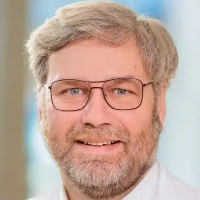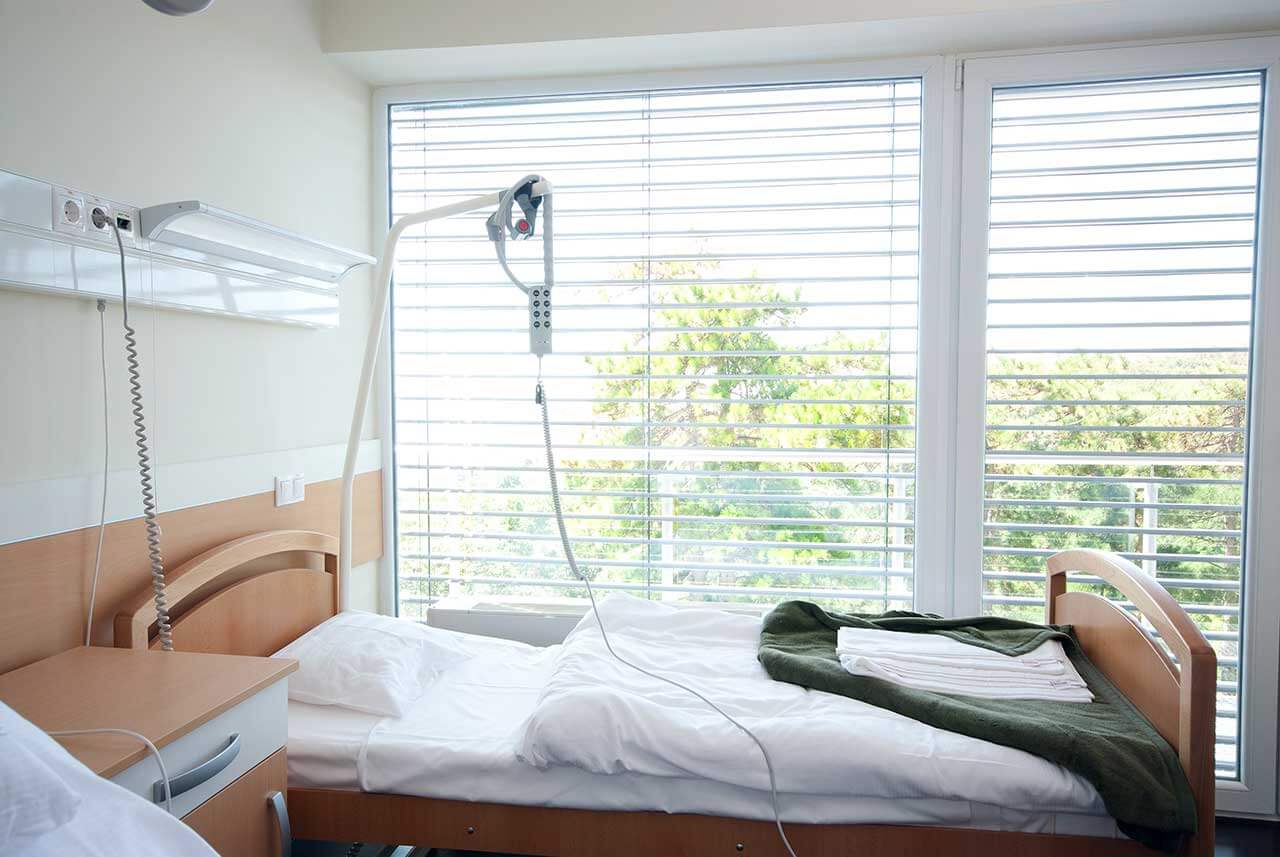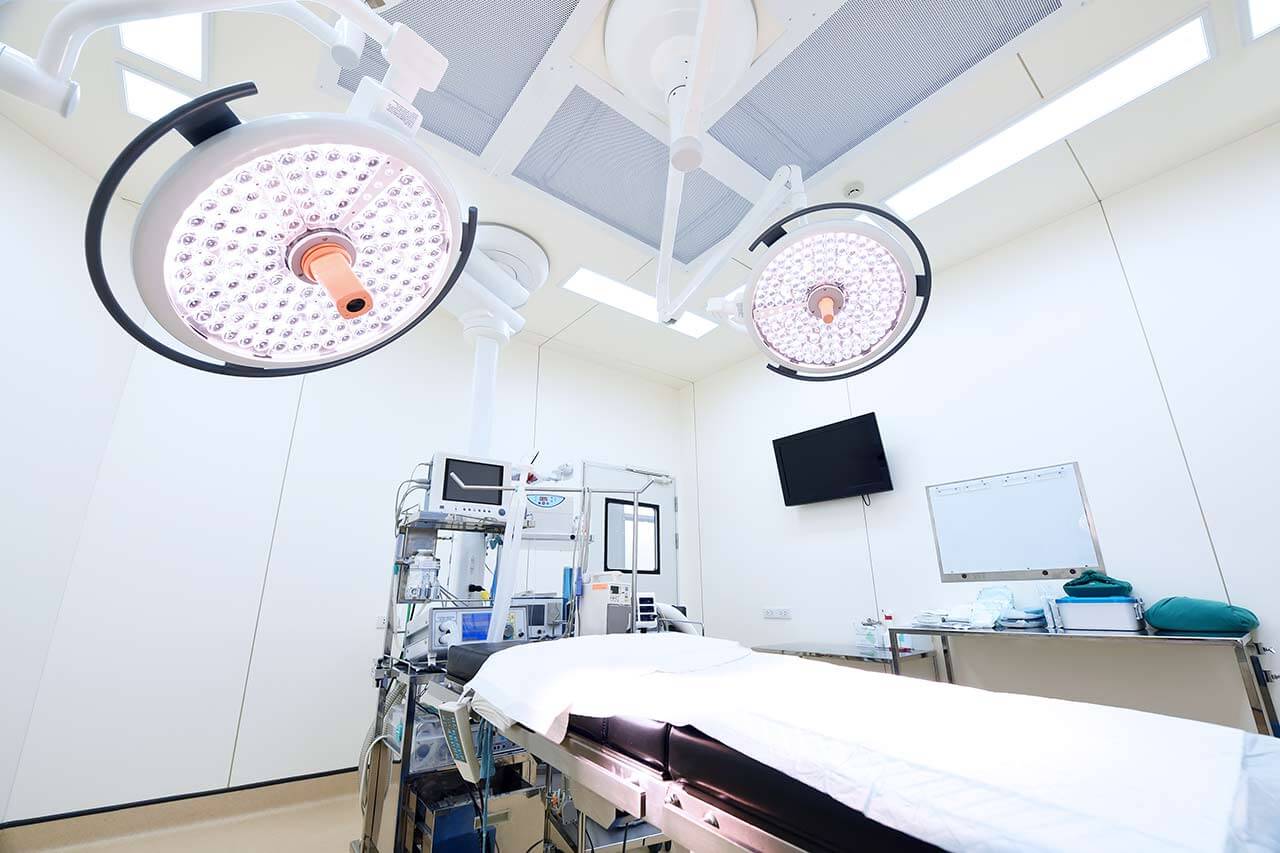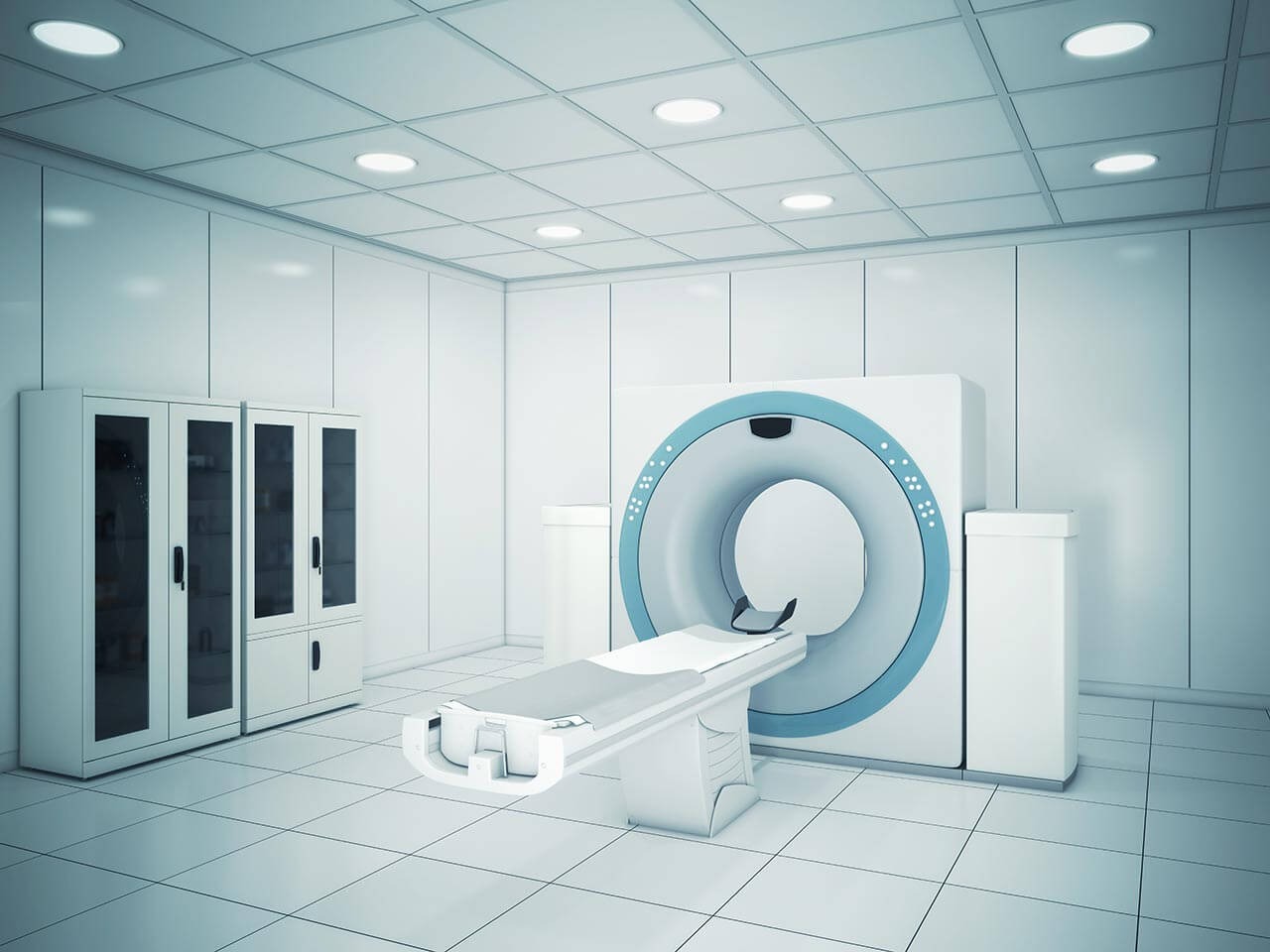
The program includes:
- Initial presentation in the clinic
- clinical history taking
- review of medical records
- physical examination
- laboratory tests:
- complete blood count
- general urine analysis
- biochemical analysis of blood
- inflammation indicators (CRP, ESR)
- indicators blood coagulation
- neurological examination
- functionality x-ray
- neuropsychological tests (on indications):
- ENMG (electroneuromyography)
- SEPs (somatosensory evoked potentials)
- CT/MRI of the spine
- myelography
- preoperative care
- decompressive laminectomy and discotomy (1 segment)
- postoperative control
- symptomatic treatment
- control examinations
- the cost of essential medicines and materials
- nursing services
- full hospital accommodation
- developing of further guidance
Required documents
- Medical records
- X-ray examination, MRI/CT scan (if available)
Service
You may also book:
 BookingHealth Price from:
BookingHealth Price from:
About the department
The Department of Spinal Surgery at the Marienhaus Hospital St. Elisabeth Neuwied offers the full range of modern surgical treatments for spinal diseases. The department performs microsurgical spinal interventions for herniated discs and post-nucleotomy syndrome and provides comprehensive treatment for acute spinal injuries. The department has special experience in performing minimally invasive surgical procedures. Surgeons perform spinal fusions for spinal fractures and tumors almost every day. Surgical interventions for spinal stenosis are also performed using low-traumatic techniques. It is no secret that spinal diseases and injuries cause severe pain, so the department's doctors are also responsible for multimodal pain management. Patients are offered blocks to relieve back pain. Such procedures are performed on an outpatient basis. The department's team consists of highly qualified neurosurgeons, trauma surgeons, and orthopedists. The specialists work hand in hand for the benefit of patients, applying all their experience and professional knowledge to restore patients' health. It is worth noting that surgeons work with state-of-the-art medical equipment, and the medical facility is one of the few in Germany where the advanced intraoperative O-Arm surgical imaging system is available. The department's doctors also use state-of-the-art microscopes, neuromonitoring systems, CT, and MRI devices. The goal of the department's specialists is to provide each patient with effective treatment using modern medical possibilities. The department is headed by Dr. med. Walter Richter.
Spinal surgery is a high-tech area of medicine, and therefore specialists in this field require state-of-the-art medical equipment. The department has all the necessary resources for a comprehensive spinal diagnosis, including computed tomography and magnetic resonance imaging. The department's operating rooms are equipped in accordance with international standards in this field. A source of pride for the medical facility is the intraoperative O-Arm system. The device is expensive, so only leading European hospitals can offer surgery using it. The O-Arm system is a mobile intraoperative imaging device designed specifically for spinal surgery. The intraoperative navigation system allows for performing spinal surgery using minimally invasive techniques while ensuring the highest accuracy of each surgical manipulation. This is due to the fact that surgeons operate on patients based on continuous real-time 2D and 3D images of the operating field on the screen during the entire operation. In just a few seconds, the built-in O-Arm scanner rotates 360° around the patient's body, generating high-precision images. The intraoperative system not only guarantees maximum accuracy when placing implants, screws, and rods but also significantly reduces radiation dose, with a 90% decrease in X-ray radiation intensity during surgery. The use of the O-Arm helps the doctors control intraoperative hemostasis and significantly reduces blood loss during surgery. In addition, the device allows for nerve function monitoring in the surgical field, which is especially important during the resection of spinal tumors.
The department’s surgeons plan the course of many spinal interventions in advance using state-of-the-art computerized equipment. For example, minimally invasive spinal fusion is routinely performed on patients with spinal fractures or tumors. The department's surgeons have vast experience in spinal fusion, which significantly reduces any risks to the patient. During this surgery, a fractured or damaged vertebra is replaced with a special titanium fixation device.
The department's team of spinal surgeons is deservedly proud of its outstanding success in cervical spine surgery. The medical facility offers several effective techniques that are recognized in the international medical arena. Surgeons implant special fixators in the intervertebral space in cases of stenosis due to pathological changes in bone structures. In cases of minor disc dislocations and herniations, disc prosthetic repair is the optimal treatment option. In addition to replacing the affected disc, the prosthesis also protects adjacent ones. This approach preserves the full range of spinal mobility. If it is necessary to remove one or more vertebral bodies, anterior and posterior interbody spinal fusions are performed.
The department's specialists have in their arsenal all modern treatment methods for chronic back pain. The medical facility most often uses a multimodal approach to the treatment of chronic pain. Spinal surgeons, physiotherapists, occupational therapists, massage therapists, chiropractors, and other specialists work with the patient. The patient also receives drug therapy. If the conservative course of treatment does not give a good result, the department's doctors consider interventional pain management options, such as spinal blocks. At the stage of preparation for the spinal block, the patient undergoes a CT and/or MRI scan in order to accurately determine the location of the pathological focus. During the therapeutic procedure, the specialist injects a drug into a specific area in the back. In most cases, a glucocorticosteroid is injected in combination with an anesthetic, as these drugs ensure an effective analgesic effect. The injection is performed under CT guidance to provide patients with high accuracy and safety during the interventional procedure.
The department's key clinical focuses include:
- Surgical treatment of spinal diseases
- Microsurgical spinal surgery, including operations for herniated discs and post-nucleotomy syndrome
- Minimally invasive surgery for degenerative changes in the cervical and lumbar spine
- Minimally invasive surgery for spinal fractures using transthoracic and transabdominal approaches
- Minimally invasive surgery for spinal fractures due to osteoporosis with filling the vertebrae with bone cement (minimally invasive surgery)
- Minimally invasive surgery for vertebral displacement and spinal instability
- Minimally invasive surgery for spinal instability after previous surgical interventions (for example, after laminectomy or operations for inflammatory processes)
- Dorsal screw osteosynthesis of the cervical spine (for example, for pseudarthrosis or for cervical myelopathy)
- Minimally invasive surgery for the removal of benign and malignant spinal tumors
- Minimally invasive surgery for cervical and lumbar spinal stenosis
- Decompression for spinal stenosis
- Conservative treatment of spinal diseases
- Multimodal pain management for chronic back pain: drug therapy, physiotherapy, occupational therapy, massage, and manual therapy
- CT-guided spinal block (interventional procedure)
- Treatment with Halo vests and special corsets
- Other therapeutic options
Curriculum vitae
Higher Education and Professional Career
- 1980 - 1986 Medical studies at the University of Cologne.
- 1987 - 1994 Professional training for Neurosurgeon at the Hospital Cologne-Merheim.
- 1994 Board certification in Neurosurgery.
- 1998 Work at the position of Senior Physician.
- 2006 Appointed as Head Physician in the Department of Spinal Surgery at the Marienhaus Hospital St. Elisabeth Neuwied.
Clinical Interests
- Surgery for spinal instability.
- Prosthetic repair of intervertebral discs in the cervical spine.
- Microsurgical operations on the intervertebral discs.
Memberships in Professional Societies
- German Society of Neurosurgery.
- German Spine Society.
- AO Spine International.
- American Association of Neurological Surgeons (AANS).
- Professional Association of German Neurosurgeons (BDNC).
Photo of the doctor: (c) Marienhaus Kliniken GmbH
About hospital
The Marienhaus Hospital St. Elisabeth Neuwied is an advanced health facility with an excellent reputation in the national medical arena. It is the largest medical complex in the state of Rhineland-Palatinate. The Marienhaus Hospital St. Elisabeth Neuwied is an academic hospital of Johannes Gutenberg University Mainz and an academic hospital of Maastricht University in the Netherlands. The status of an academic hospital provides access to the very latest achievements of European medicine in diagnostics and treatment. The health of patients is in the safe hands of a highly qualified team of doctors and nursing staff. The specialists make every effort to provide each patient with the most effective and personalized care in comfortable conditions.
The hospital has 11 specialized departments, as well as day clinics, outpatient clinics, and specialized centers. Clinical practice offers such medical fields as general surgery, abdominal surgery, vascular surgery, gynecology, obstetrics, radiology, gastroenterology, diabetology, cardiology, trauma surgery, urology, spinal surgery, and pediatric and adolescent medicine.
The hospital has 429 beds for an inpatient hospital stay. The health facility admits about 19,000 inpatients and more than 35,000 outpatients annually. The hospital's specialists provide comprehensive and high-quality medical care focused on meeting the specific needs and wishes of each patient.
The hospital implemented an effective quality control system corresponding to ISO 9001 standards more than 15 years ago. The purpose of this system is to provide continuous and patient-oriented monitoring of medical and administrative processes.
Many departments in the hospital have been awarded prestigious quality certificates, including a certificate from the German Cancer Society (DKG) for the treatment of breast and gynecological cancers, a certificate from the German Cardiac Society (DGK) for the treatment of acute coronary syndrome, an EndoCert certificate for joint replacement surgery, a certificate from the German Society of Vascular Surgery (DGG), and others.
Photo: (с) depositphotos
Accommodation in hospital
Patients rooms
The patients of the Marienhaus Hospital St. Elisabeth Neuwied live in single or double rooms. All patient rooms are comfortable and designed in light colors. Each patient room has an ensuite bathroom with a shower and a toilet. The patient room furnishings include an automatically adjustable bed, a bedside table, a table and chairs for receiving visitors, a wardrobe for storing personal belongings, a telephone, and a TV. Wi-Fi access is also available throughout the hospital. Most patient rooms in the hospital have large panoramic windows, offering a beautiful view.
If desired, patients can live in enhanced-comfort rooms. Such rooms are more spacious, and they are additionally equipped with a mini-fridge, a safe, and upholstered furniture. The bathroom has a hairdryer, a cosmetic mirror, towels, a bathrobe, and toiletries.
Meals and Menus
The patients of the hospital are offered three tasty meals a day: breakfast, lunch, and dinner. There is a choice of several lunch menu options every day. Breakfast and dinner are served buffet-style, allowing patients to choose meals independently. The menu also includes daily options for dietary and vegetarian meals. Individual menus are provided for patients as well, if necessary.
The patients staying in enhanced-comfort rooms are offered tea, coffee, and juices, as well as fresh fruits and snacks, in addition to a varied three meals a day.
The hospital also houses a cozy cafe. The menu includes complex breakfasts and lunches, salads, snacks, desserts, and hot and cold drinks.
Further details
Standard rooms include:
Accompanying person
The accompanying person may stay with you in the patient room or at the hotel of your choice during the inpatient program.
Hotel
You may stay at the hotel of your choice during the outpatient program. Our manager will help you choose the best option.




